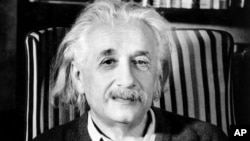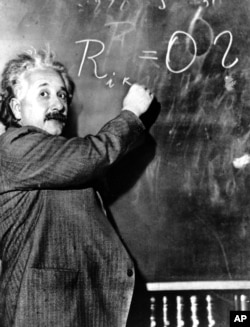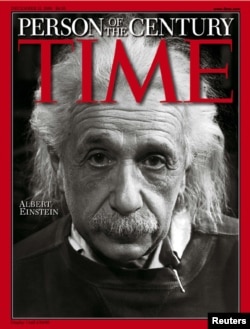On this day in 1879, famed physicist Albert Einstein was born in Ulm, Germany.
Best known for his theories of relativity, Einstein would toil alone with his obsessive queries of the universe for years in the Swiss patent office before gaining international recognition by winning the Nobel Prize for physics in 1921.
Space and time and E = mc 2
In 1905, Einstein addressed what he termed his special theory of relativity. In special relativity, time and space are not absolute, but relative to the motion of the observer.
In other words, Einstein posited that the universe was not static, but instead, expanding.
Thus, two objects traveling at great speeds with regard to each other would not necessarily observe simultaneous events in time at the same moment, nor agree on their measurements of space. He theorized that the speed of light, which is the limiting speed of any body having mass, is constant in all frames of reference.
He expanded on this theory, searching for a mathematical equation that could calculate his belief that mass and energy were equivalent. Einstein famously created that equation, known as E = mc 2.
General relativity
In 1916, he published The Foundation of the General Theory of Relativity, which proposed that gravity, as well as motion, impact time and space.
According to Einstein, gravitation is not a force, as his longtime scientific hero Isaac Newton had argued; rather, Einstein believed gravity was a curved field in the space-time continuum, created by the presence of mass.
An object of very large gravitational mass, such as the sun, would therefore appear to warp space and time around it, which could be demonstrated by observing starlight as it skirted the sun on its way to earth.
In 1919, astronomers studying a solar eclipse confirmed Einstein’s general theory of relativity, propelling him to instant celebrity.
As a world-renowned public figure, he became increasingly political, taking up the cause of Zionism and speaking out against militarism and rearmament.
In his native Germany, this made him an unpopular figure. After Nazi leader Adolf Hitler became chancellor of Germany in 1933, Einstein renounced his German citizenship, freeing him from military service, and left the country. He later moved to the United States and became a U.S. citizen.
The atom bomb
In 1939, despite his lifelong pacifist beliefs, he agreed to write to President Franklin D. Roosevelt on behalf of a group of scientists who were concerned with American inaction in the field of atomic-weapons research.
“The important thing is not to stop questioning; curiosity has its own reason for existing." Albert Einsten
Like the other scientists, he feared sole German possession of such a weapon.
He played no role in the subsequent Manhattan Project and later deplored the use of atomic bombs against Japan.
After the war, he called for the establishment of a world government that would control nuclear technology and prevent future armed conflict.
Later in life, he worked on a unified field theory, which he never completed to his or other scientists’ satisfaction.
Einstein died on April 18, 1955, in Princeton, New Jersey. In 1999, Time magazine named him Person of the Century.








